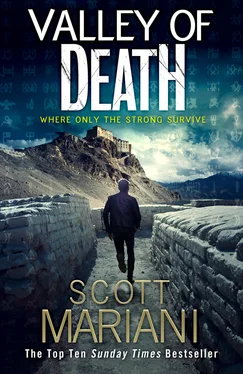It was hard to believe that such an arid and inhospitable area could have once been a major centre of one of the largest and most advanced cultures of the ancient world. But that was exactly what it was.
To say that the lost Harappan or Indus Valley Civilisation was Kabir’s overriding interest in life would have been a crashing understatement. Long, long ago, over a stretch of time spanning one and a half thousand years during the second and third millennia BCE, the culture had thrived throughout the north-western parts of South Asia. Their empire had been larger than that of Mesopotamia; greater even than that of ancient Egypt or China. It had covered a vast area comprising parts of what were today Afghanistan, Pakistan and north-west India. At its peak, it was thought to support a population of five million inhabitants, which by ancient standards was enormous.
And yet, virtually nothing was known about these people. Nobody even knew what they called themselves, let alone how they organised their society. The most baffling enigma of all was the question of what had finally caused their whole civilisation to crumble and disappear in an astonishingly short time.
For years, it had been widely assumed in the archaeology world that the main centres of the Indus Valley Civilisation had been the excavated cities at Harappa and Mohenjo-Daro, both in Pakistan. This had been a major frustration for archaeologists from India, since tensions between the two nations made it hard for them to travel freely in their neighbouring country. More recently, important finds made at Rakhigarhi in India’s Haryana region had radically changed that view. Many historians and archaeologists now believed that the sheer size of the site excavated at Rakhigarhi, and the wealth of incredible, priceless artefacts found under its dusty, rocky ground, pointed to its having once been the capital of the entire civilisation. If that was true, as Kabir fervently wished it was, then it might offer scholars the opportunity to finally start figuring out the secrets of the ancient lost culture.
Exactly what he hoped to find here, all this way from the main Rakhigarhi site, Kabir couldn’t say for certain. All his hopes were pinned on the remarkable journals, which described ‘a vast treasure most precious to all men on earth’. The man who’d penned those words had been one of the most important explorers of his generation. If his claims were right, Kabir could be standing, literally, on top of the biggest and most valuable archaeological find ever.
Treasure . The excitement he felt at the sound of that word took his breath away.
But even once he found it, getting it out of the ground would be no easy task. Kabir had already made some private, tentative enquiries among his contacts in the Indian government. They were unlikely to agree to fund a new excavation project, but as long as they agreed in principle, Kabir was more than willing to pay for it out of his own pocket. His very own private dig, fully under his own supervision. He calculated that to bring in sufficient manpower and equipment to get things rolling would cost him at least a hundred million rupees, equivalent to about one and a half million American dollars.
Kabir didn’t blink at those figures. The benefits of being born into wealth.
Manish and Sai caught up with him and the three of them walked on, following the river bed. Each man was silent, gazing at the rocky ground underfoot and imagining what wonders might be hidden below. It was a heady feeling. Finally, Manish said, ‘Wow, boss, you really think it’s here somewhere?’
Kabir said nothing. He was gazing into the distance as he walked. His step slowed, then slowed again, and he halted, his eyes still fixed on some faraway point on the rocky horizon to the south-west of the river valley. He frowned. Looked again at the iPhone screen, then studied the horizon once more. Manish and Sai exchanged glances, wondering what the professor had seen. Manish asked, ‘What’s up?’
Kabir remained quiet for a moment longer, then pointed in the direction he’d been gazing. ‘See that range of hills over there?’
Manish and Sai looked. ‘Yeah, I see it,’ Sai replied. Manish asked, ‘What about it?’
Kabir lowered his pointing finger and tapped the iPhone screen with it. He frowned harder. ‘It’s not here.’
Manish shrugged and said, ‘So? Everything else is the same. We must be in the right place.’
Kabir shook his head. ‘Those hills have been there since prehistoric times, Manish. They didn’t just sprout up in the last two hundred years. Trafford would have drawn them on the map, like he drew everything else. He didn’t. Something’s wrong.’ He was suddenly anxious. He bit his lip and compared the map and the landscape once more.
‘But the coordinates led us here,’ Sai said. ‘They must be right.’
Kabir sighed. ‘The coordinates are based on one guy’s skill with compass and stars, long before we had pinpoint-accurate navigational technology. There’s little margin for error. One tiny slip on Trafford’s part and the GPS could take us half a mile off course, or more.’
‘So what are you saying?’ Manish asked, staring at him.
‘I’m saying there’s a disparity between the map and this location that I hadn’t noticed before.’
Sai said, ‘In other words, we’re in the wrong bloody place.’
Manish was about to say something when he suddenly froze. ‘Hear that?’
Sai said, ‘What?’
Now Kabir heard it, too, and turned to look in the direction of the sound.
The approaching vehicle appeared on the ridge above the river valley, some ninety or a hundred yards to the west, the direction of the parked helicopter. Kabir instinctively didn’t like the look of it. As he watched, it tipped over the edge of the slope and started bouncing and pattering its way down the hillside towards them, throwing up a dust plume in its wake. It was moving fast. Some kind of rugged four-wheel-drive, like the Nissan Jonga jeeps the Indian Army used to use.
‘Who are they, boss?’ Sai asked apprehensively.
‘No idea. But I think we’re about to find out.’
The jeep reached the bottom of the hillside and kept coming straight towards them, lurching and dipping over the rubble. Then it stopped, still a long way off. The terrain on the approach to the river bed was too rough even for an off-roader. The doors opened. Two men climbed out of the front. Three more climbed out of the back. All of them were clutching automatic rifles, but they definitely weren’t the Indian Army.
‘Dacoits!’ Manish yelped.
Sai’s jaw dropped open. An expression of pure horror plastered his face. ‘Oh, shit.’
Dacoits were bandits, of which there were many gangs across north-west India. They were growing bolder each year, despite the increasingly militarised and notoriously brutal efforts of the police to round them all up. Kabir had read a few days earlier that an armed gang of them had robbed a bank in Haryana. Their sudden appearance was the last thing he’d have expected out here, in the middle of the wilderness. But all the same he now cursed himself for having left his self-defence pistol at home in Delhi. His mouth went dry.
‘They must have seen us landing,’ Sai said in a hoarse, panicky whisper. ‘What are we going to do, boss?’ Both he and Manish were looking to their professor as though he could magically get them out of this.
The five men were striding purposefully towards them. Spreading out now. Raising their weapons. Taking aim. Looking like they meant it.
‘Run,’ Kabir said. ‘Just run!’
And then the gunshots began to crack out across the valley.
Chapter 1 Contents Cover Title Page VALLEY OF DEATH Scott Mariani Copyright Praise Prologue Chapter 1 Chapter 2 Chapter 3 Chapter 4 Chapter 5 Chapter 6 Chapter 7 Chapter 8 Chapter 9 Chapter 10 Chapter 11 Chapter 12 Chapter 13 Chapter 14 Chapter 15 Chapter 16 Chapter 17 Chapter 18 Chapter 19 Chapter 20 Chapter 21 Chapter 22 Chapter 23 Chapter 24 Chapter 25 Chapter 26 Chapter 27 Chapter 28 Chapter 29 Chapter 30 Chapter 31 Chapter 32 Chapter 33 Chapter 34 Chapter 35 Chapter 36 Chapter 37 Chapter 38 Chapter 39 Chapter 40 Chapter 41 Chapter 42 Chapter 43 Chapter 44 Chapter 45 Chapter 46 Chapter 47 Chapter 48 Chapter 49 Chapter 50 Chapter 51 Chapter 52 Chapter 53 Chapter 54 Chapter 55 Chapter 56 Chapter 57 Chapter 58 Chapter 59 Chapter 60 Chapter 61 Chapter 62 Chapter 63 Chapter 64 Chapter 65 Chapter 66 Chapter 67 Chapter 68 Chapter 69 Chapter 70 Chapter 71 The Ben Hope series Keep Reading … About the Author By the Same Author About the Publisher
Читать дальше












